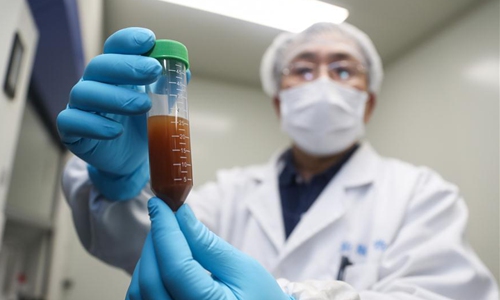HOME >> CHINA
Shanghai announces progress in COVID-19 vaccine development
By Du Qiongfang and Chen Shasha Source:Global Times Published: 2020/3/16 21:08:41

A researcher of Stermirna Therapeutics Co., Ltd. shows the experiment to develop an mRNA vaccine targeting the novel coronavirus in east China's Shanghai, Jan. 29, 2020. (Xinhua/Ding Ting)
Shanghai authorities on Monday revealed China's latest achievement of COVID-19 vaccine development, as vaccines have begun animal testing and are expected to start clinical trials in mid-April, a move experts hailed as not many countries have achieved this yet.
The government of Shanghai announced on Monday that the city has made progress in COVID-19 vaccine development with an mRNA vaccine starting preliminary primate trials and clinical trials expected in mid-April.
Moreover, another kind of vaccine, the virus like particles (VLP) vaccine developed in the city, has produced specific antibodies in mice.
This signals China's big step in developing a coronavirus vaccine, and it is at the international level as many countries haven't yet entered the stage of animal testing, said Yang Zhanqiu, a virologist at Wuhan University.
But it takes at least three months to finish animal tests, Yang told the Global Times, predicting that, if it works, the vaccine could be used for ordinary people in the upcoming winter season at the earliest.
"Normally, it takes three to five years, even 10 years, to develop a vaccine," said Yang who noted that even though it takes a long time to develop new vaccines, the research is still very meaningful as the virus could possibly emerge at any time.
Shanghai-based GL Biochem (Shanghai) Ltd, a leading manufacturer of peptide products, active pharmaceutical ingredients for peptide antigen vaccine, another kind of vaccine, has produced nearly 4,000 kinds of potential peptide antigens for over 30 vaccine companies and institutes at home and abroad, including China’s “SARS Hero” Zhong Nanshan’s lab and the laboratory of Rolf Hilgenfeld, German coronavirus research expert and professor at the Lubeck University.
Peptide-based vaccines can be injected into human bodies to produce antibodies to combat the virus, Xu Hongyan, president and CEO of GL Biochem (Shanghai), told the Global Times on Monday.
Previous media reports showed that R&D into a vaccine for SARS was stopped due to concerns over cycles and costs. According to Xu, the average R&D and production cost of each peptide antigen is around 3,000 yuan ($428.42) to 4,000 yuan.
Xu thinks the vaccine R&D this time will not stop because the virus can return anytime and it does great harm to people and society. "Next time we cannot depend on the lockdown of cities but should depend on science. The lessons from the COVID-19 epidemic are profound. Even if the epidemic is over, the vaccine R&D will not stop," Xu said.
Since the viral outbreak, scientific research on treatment, drugs and vaccines has become a global effort. Fosun Pharma, a leading Chinese pharmaceutical firm, announced on Sunday that it will work jointly with German biotech firm BitoNTech to develop an mRNA vaccine.
The US government announced that the first participant in a clinical trial for a vaccine to protect against the new coronavirus will receive an experimental dose on Monday, according to AP.
The US government also attempted to persuade a German firm developing a possible vaccine for coronavirus to move its research work to the US, according to German officials. But this raised fears in Berlin that the US was trying to assure that any inoculation would be available first, and perhaps exclusively, in the US, media reported.
Chinese observers said the worldwide unprecedented speed of developing coronavirus vaccines should give thanks in large part to early Chinese efforts to sequence the genetic material of COVID-19. China shared that sequence in early January, allowing research groups around the world to grow the live virus and study how it invades human cells and makes people sick.
Posted in: SOCIETY